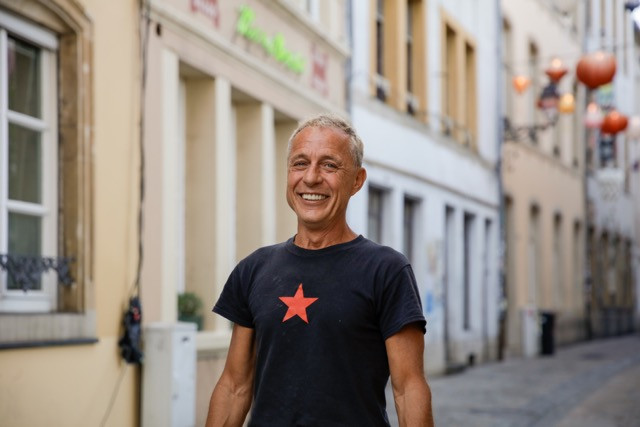Lucien Elsen’s career in the catering business started rather modestly as a street vendor selling organic whole-wheat pasta. Bitten by the bug, he decided to get the best training available and spent four years learning his craft in speciality restaurants, doing everything from prep cooking to dishwashing, before finding his true calling--macro-biotic vegetarian and fish-based Japanese cuisine. He opened a restaurant, Shanti, catering to what was initially a very niche crowd in Brussels. The makeshift restaurant, which Lucien bought for a song, was small but cosy and furnished with upcycled chairs and tables. Lucien focused on local produce and while the restaurant was humming along nicely, a glowing review in the media suddenly propelled Shanti and Lucien into the spotlight and the venue became a hit.
That success allowed Lucien to fulfil another of his dreams--to study food design in San Francisco. But while there he became aware that a space was available in his home town, and he seized the opportunity to open Mesa Verde in the rue du St. Espirt in the government quarter of the capital city in November 1990.
The first meat-free restaurant in Luxembourg, Mesa Verde was initially shunned by many at the time--“they called us rabbits,” he says of the derision piled on the place by people who, years later, would rave about vegetarianism when it became trendy.
Unchanged menu
But a small and enthusiastic crowd were attracted to the restaurant’s innovative menu, cool décor and relaxed atmosphere. It was even named “best new restaurant” in a poll conducted by the now defunct “Luxembourg Business” magazine in 1991. Lucien hasn’t looked back since, and, indeed, the menu hasn’t changed in 30 years. Vegetarian dishes such as Greek style crêpes with ricotta, feta and spinach or an “escalope” of seitan with a mushroom sauce remain popular. Lucien’s grilled salmon in teriyaki sauce is divine and the Kyoto Dream menu, featuring salad, miso soup, scampi tempura and grilled fish is a winner every time.
But Mesa Verde has always been so much more than a good restaurant. Lucien is renowned for hosting brilliant parties, and in the early 90s he was responsible for bringing pioneering DJ Maxwell George to Luxembourg. The success of the parties led Lucien to open Subterranea in a location just 50 metres along the rue du Saint Esprit (the venue is now de Gudde Wëllen) and that proved to be another success that attracted international and local DJs and world music stars.
Pioneering parties
In 1995, when Luxembourg was the European capital of culture, Lucien also launched the Holy Ghost Street Party to celebrate the eve of National Day. That event soon spread to take over the entire St. Esprit plateau (before the Cité judiciaire courts complex was built there) and was the focal point for the biggest party of the year. And even though that party was scaled down and moved to the corniche, where Tim Probyn and Henrik Jensen--who he counts as fellow pioneers--still put on the “Elevator” stage, Lucien misses the “innocence” of those days. He has also worked with the city authorities to put on concerts as part of the fête de la musique and he has usd his connections to bring over some excellent musicians for the MeYouZik word music festival.
But Lucien looks around sometimes and laments the slow erosion of what he calls the “soul” of society. To counter this, he and his partner Vanessa Buffone created a space under the tree of Mesa Verde’s terrace for creative writing workshops--a project in collaboration with the cultural service of the Ville de Luxembourg and the Within association. The tree is now adorned with notes from the writers who took part and a beautifully bound anthology of their writing has also been published.
What form the celebration for Mesa Verde’s 30th anniversary, which falls in 13 November, actually takes remains to be seen--much is dependent on what Covid restrictions will be in place. But as Lucien says, “30 years is far from the end, it’s just the beginning!”
